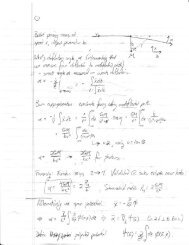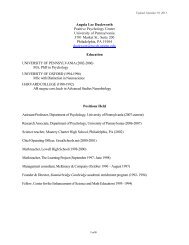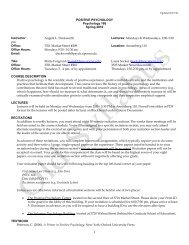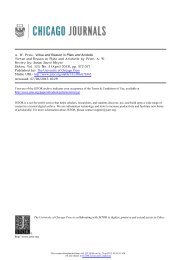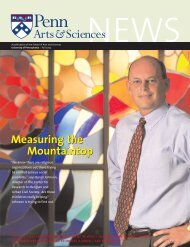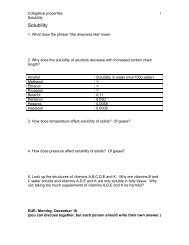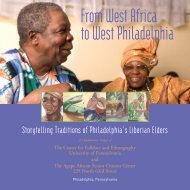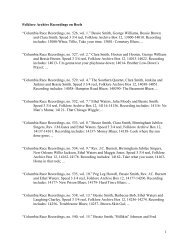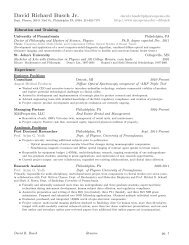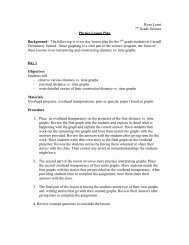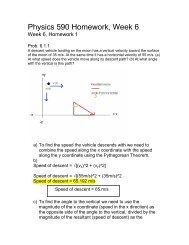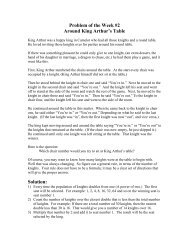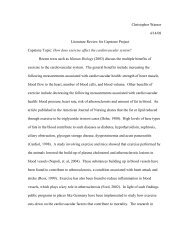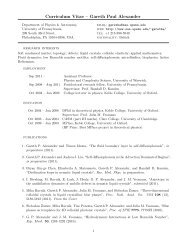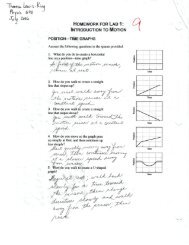PENN SUMMER - University of Pennsylvania
PENN SUMMER - University of Pennsylvania
PENN SUMMER - University of Pennsylvania
Create successful ePaper yourself
Turn your PDF publications into a flip-book with our unique Google optimized e-Paper software.
MaTheMaTiCS<br />
MaTh 103 920 MTWr 10:00am–12:10pm staff<br />
Introduction to Calculus<br />
Fulfills Formal Reasoning Course<br />
Introduction to concepts and methods <strong>of</strong> calculus for students with<br />
little or no previous calculus experience. Polynomial and elementary<br />
transcendental functions and their applications, derivatives, extremum<br />
problems, curve-sketching, approximations; integrals and the<br />
fundamental theorem <strong>of</strong> calculus.<br />
MaTh 104 920 MTWr 10:00am–12:10pm staff<br />
Calculus I<br />
Fulfills Formal Reasoning Course<br />
Brief review <strong>of</strong> High School calculus, applications <strong>of</strong> integrals, transcendental<br />
functions, methods <strong>of</strong> integration, infinite series, Taylor’s<br />
theorem. Use <strong>of</strong> symbolic manipulation and graphics s<strong>of</strong>tware in<br />
calculus.<br />
MaTh 114 920 MTWr 1:00pm–3:10pm staff<br />
Calculus II<br />
Fulfills Formal Reasoning Course / Prerequisite(s): MATH 104<br />
Functions <strong>of</strong> several variables, vector-valued functions, partial derivatives<br />
and applications, double and triple integrals, conic sections,<br />
polar coordinates, vectors and analytic geometry, first and second order<br />
ordinary differential equations. Applications to physical sciences.<br />
Use <strong>of</strong> symbolic manipulation and graphics s<strong>of</strong>tware in calculus.<br />
MaTh 114 937 MTWr 1:00pm–3:10pm rimmer<br />
Calculus, Part II<br />
This course is delivered in a fully online format in order to allow more<br />
flexibility for LPS students. Class sessions are <strong>of</strong>fered through a course<br />
website and include live lectures and interactive discussions through both<br />
direct messaging and voice over internet. Between classes, the learning<br />
experience is extended through assignments, threaded discussions and<br />
<strong>of</strong>fice hours. For additional information, please visit www.sas.upenn.edu/<br />
lps/online. Online course fee: $60.<br />
Fulfills Formal Reasoning Course / Prerequisite(s): MATH 104<br />
Functions <strong>of</strong> several variables, vector-valued functions, partial derivatives<br />
and applications, double and triple integrals, conic sections,<br />
polar coordinates, vectors and analytic geometry, first and second order<br />
ordinary differential equations. Applications to physical sciences.<br />
Use <strong>of</strong> symbolic manipulation and graphics s<strong>of</strong>tware in calculus.<br />
MaTh 115 920 MTWr 1:00pm–3:10pm staff<br />
Calculus, Part II with Probability and Matrices<br />
Fulfills Formal Reasoning Course / Prerequisite(s): MATH 104<br />
Functions <strong>of</strong> several variables, partial derivatives, multiple integrals,<br />
differential equations; introduction to linear algebra and matrices<br />
with applications to linear programming and Markov processes.<br />
Elements <strong>of</strong> probability and statistics. Applications to social and biological<br />
sciences. Use <strong>of</strong> symbolic manipulation and graphics s<strong>of</strong>tware<br />
in calculus.<br />
MaTh 170 920 MTWr 1:00pm–3:10pm staff<br />
Ideas in Mathematics<br />
Fulfills Formal Reasoning Course, Natural Science & Math Sector / May also<br />
be counted toward the General Requirement in Natural Science & Mathematics<br />
Topics from among the following: logic, sets, calculus, probability,<br />
history and philosophy <strong>of</strong> mathematics, game theory, geometry, and<br />
their relevance to contemporary science and society.<br />
MaTh 240 920 MTWr 1:00pm–3:10pm staff<br />
Calculus III<br />
Prerequisite(s): Calculus II<br />
Linear algebra: vectors, matrices, systems <strong>of</strong> linear equations, eigenvalues<br />
and eigenvectors. Vector calculus: functions <strong>of</strong> several variables,<br />
vector fields, line and surface integrals, Green’s, Stokes’ and<br />
divergence theorems. Series solutions <strong>of</strong> ordinary differential equations,<br />
Laplace transforms and systems <strong>of</strong> ordinary differential equations.<br />
Use <strong>of</strong> symbolic manipulation and graphics s<strong>of</strong>tware.<br />
MaTh 241 920 MTWr 1:00pm–3:10pm staff<br />
Calculus IV<br />
Prerequisite(s): MATH 240<br />
Sturm-Liouville problems, orthogonal functions, Fourier series, and<br />
partial differential equations including solutions <strong>of</strong> the wave, heat<br />
and Laplace equations, Fourier transforms. Introduction to complex<br />
analysis. Use <strong>of</strong> symbolic manipulation and graphics s<strong>of</strong>tware.<br />
MUSiC<br />
MusC 050 937 MW 5:00pm–7:00pm Muller<br />
World Music and Cultures<br />
This course is delivered in a fully online format in order to allow more<br />
flexibility for LPS students. Class sessions are <strong>of</strong>fered through a course<br />
website and include live lectures and interactive discussions through both<br />
direct messaging and voice over internet. Between classes, the learning<br />
experience is extended through assignments, threaded discussions and<br />
<strong>of</strong>fice hours. For additional information, please visit www.sas.upenn.edu/<br />
lps/online. Online course fee: $60.<br />
Fulfills Arts & Letters Sector, Cross Cultural Analysis Course, Cultural Diversity<br />
in the U.S. (Class <strong>of</strong> ’12 and after)<br />
This course examines how we as consumers in the “Western” world<br />
engage with musical difference largely through the products <strong>of</strong> the<br />
global entertainment industry. We examine music cultures in contact<br />
in a variety <strong>of</strong> ways—particularly as traditions in transformation.<br />
Students gain an understanding <strong>of</strong> traditional music as live, meaningful<br />
person-to-person music making, by examining the music in<br />
its original site <strong>of</strong> production, and then considering its transformation<br />
once it is removed, and re-contextualized in a variety <strong>of</strong> ways.<br />
The purpose <strong>of</strong> the course is to enable students to become informed<br />
and critical consumers <strong>of</strong> “World Music” by telling a series <strong>of</strong> stories<br />
about particular recordings made with, or using the music <strong>of</strong>, peoples<br />
culturally and geographically distant from the U.S. Students come to<br />
understand that not all music downloads containing music from unfamiliar<br />
places are the same, and that particular recordings may be<br />
embedded in intriguing and controversial narratives <strong>of</strong> production<br />
and consumption. At the very least, students should emerge from<br />
the class with a clear understanding that the production, distribution,<br />
and consumption <strong>of</strong> world music is rarely a neutral process.<br />
<strong>SUMMER</strong> SESSIOn II • JULY 6–AUgUST 13, 2010 33



